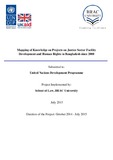Mapping of knowledge on projects on justice sector facility development and human rights in Bangladesh since 2000

View/Open
Date
2015-07Publisher
School of Law, BRAC UniversityAuthor
Islam, Md. Rizwanul
Farid, Cynthia
School of Law
Metadata
Show full item recordCitation
Islam, M. R. (ed.) (2015). Mapping of knowledge on projects on justice sector facility development and human rights in Bangladesh since 2000. School of Law, BRAC University.Abstract
The role and importance of the promotion of human rights and the development of justice sector facility in fostering a democratic culture, good governance, and economic development of a country cannot be over-emphasised. Due to the borderless nature of human rights, many international institutions and foreign governments are working for the promotion and protection of human rights worldwide. In Bangladesh too, many multilateral donor agencies, agencies of foreign governments, and the Government of Bangladesh (GOB) itself have undertaken numerous research projects on various aspects of human rights and justice sector facility development.
These projects have aimed at strengthening existing national institutions through legal and structural reforms, promoting alternative dispute resolution mechanisms, encouraging sector wide dialogues, protecting vulnerable groups within the community, and raising awareness among stakeholders on various issues and so on. However, as these projects are often undertaken by individual agencies in isolation, and as there is no knowledge sharing platform/mechanism or a repository of all projects undertaken; there is a chance of duplication in their efforts and outputs. With this backdrop, School of Law, BRAC University has undertaken this project to create an index and an overview of projects/reports on various aspects of the development of the justice sector and the enhancement of access to justice and human rights in Bangladesh. It is expected that this endeavour would assist in avoiding duplication in future reports or assessments undertaken by donors, thereby ensuring greater harmonisation and efficacy of donor efforts in the human rights and justice sector. It should also help the non-governmental organisations (NGOs), think tanks and individuals to better target their areas of research endeavours.
This report presents summarised and synthesised briefs on projects in human rights and justice sector facility development in Bangladesh since 2000. The briefs are organised under broad subject categories and presented in alphabetical order of the respective project titles. The summarised information on each project includes information on the title of the project, funding body, and duration of the project (where available), project implementing body, relevant Key-words and the key findings of the project report. Each of the project summaries is accompanied by brief comments on the important findings of the report and/or its limitations or the scope for embarking on further works in related areas. On each of the various subject categories (except where only one report could be identified and summarised), a brief area-wise commentary on the knowledge mapped has also been written. The purpose of this section is to present the overarching themes in those individual areas which may be considered by the policy makers in future legal and policy making exercises.
Because of the number and diversity in terms of their subject, design, objective, and methodology; drawing general conclusions on the reports covered in this knowledge mapping exercise runs the risk of gross generalisation. However, certain trends are evident. The breadth of some reports is a little too ambitious reducing the scope for undertaking any thorough analysis and hence, their recommendations often suffer from the tendency of unsubstantiated or inadequately substantiated recommendations. For instance, the finding that archaic land laws and land record management system are in need of reform so that vulnerable people are protected from forcible eviction from their land, without any rigorous analysis on how the archaic laws are causing this and also without any framework for the proposed reform is of limited value. We also note that in some cases, reports on the same subject matter adopts very similar methodology and comes up with very similar observations and thus, make negligible contribution to the existing knowledge or legal or institutional reform discourse.
In view of the large number of projects and the short duration of this knowledge mapping project, only policy level project reports are summarised and synthesised in detail and commented upon. The service delivery projects or action level projects are presented through a comprehensive, but not exhaustive annotated bibliography. It is expected that the thoroughly presented bibliographic details on action level projects would be able to assist those stakeholders who may be interested in seeking further information on them. For ease of searching, complete bibliographic details of all projects covered in this report (either through summaries with comments or through the annotated bibliography) has been arranged according to donors, project implementers, and sub-sectors.
Description
This project was submitted to UNDP and implemented by School of Law, BRAC University, funded by UNDP and Uk aid as part of the JSF Project. Duration of the project was October 2014-July 2015.Department
School of LawType
Project reportCollections
- Project Report [1]
